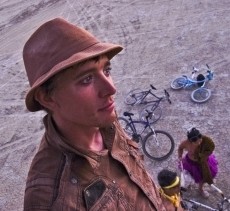 Natural Sciences
Natural Sciences
Molecular Know-How

In a way, anthills are what led Tristan Ursell into the strange world of biophysics.
Not anthills literally, but the idea that very simple organisms are capable of producing vastly complex but well-ordered structures. If you’ve ever seen a cast made by pouring plaster or concrete into a giant African anthill, you’ve seen a life-size example of just that.
Ursell (pictured), an assistant professor who joined the Department of Physics last fall, isn’t working on ants, yet. But he is exploring the relationship between proteins, bacteria and other microscopic life forms that have something in common with these workmanlike insects. Like ants, these tiny organic machines create intricate community structures to perform various environmental tasks, such as moving over surfaces or gaining access to a resource—and they do it without any obvious form of guidance.
“I’m studying down at the order of cells,” Ursell said. “But there are a lot of similarities [with the anthill analogy]. It’s unguided, there’s no central orchestration to the problem. Nobody’s holding up a set of blueprints saying, ‘You guys go over here and build this thing, you guys go over there and build that thing.’ These molecules just have to know how to do it.”
Finding out how molecules “know” what their job is takes Ursell across the boundary of physics into biology. As a rising star in the field of biophysics, he’s engaged in a relatively new way of looking at the natural world.
Not all that long ago, biology and physics were two fields that, frankly, didn’t play well together. It’s as though biologists saw physicists as people who spent their time measuring dead stuff—forces, asteroids, proton collisions—while physicists thought biologists cared only about gunk that grows in swamps.
“At one time there was a sort of stigma in physics about looking at biology,” Ursell said. “Biology is squishy and it’s dirty and it crawls. Physics is like wires and things that blink and maybe catch fire occasionally, which are exactly the qualities that biological systems do not have.”
But in recent years there’s been something of a revolution in our approach to biology, including fresh interest in what might be called the mechanics of life. Ursell is fascinated by such things as the workings of cell walls, how cells die and what allows cells or bacteria or proteins to do what they do.
One thing Ursell studies is how bacteria die, which is a hop and a skip from knowing how to kill them, which is pretty much the definition of an antibiotic. He’s not specifically looking for new drugs, but the things he learns about how cells and bacteria can be damaged or killed could be the building blocks of the next breakthrough treatment.
“He combines really important biological questions—how do cells live and die, how do antibiotics work, how do bacteria become resistant—with cutting-edge materials physics,” said biophysicist Raghuveer Parthasarathy, who led the committee that hired Ursell in 2014.
Ursell is one of just a handful of scientists approaching the biological world from so many angles. His combination of experiments, computer simulations and theoretical analysis has great potential for discoveries, Parthasarathy said.
But Ursell doesn’t confine his inquisitive nature to the classroom or lab. He has a passion for outreach and is among a growing number of researchers who enjoy talking science with nonscientists.
He’s gone so far as bringing science to Burning Man, the huge arts and culture festival in the Nevada desert. In addition to giving science talks to packed crowds, he and fellow scientists have brought microscopes to the festival so that people could get a look at some of the tiny organisms that live all around us.
Ursell found that people are fascinated by the weirdness of the microscopic world. But he’s also learned that real discovery requires attention to the mundane, as well.
“I think an important aspect to being a scientist is not just focusing on things that are outside your normal experience, but also questioning things that are inside your normal experience,” he said. “You can’t understand the weird things until you understand the normal things. Then you can begin to push the bounds of knowledge.”
―Greg Bolt


 Twitter
Twitter Facebook
Facebook Forward
Forward